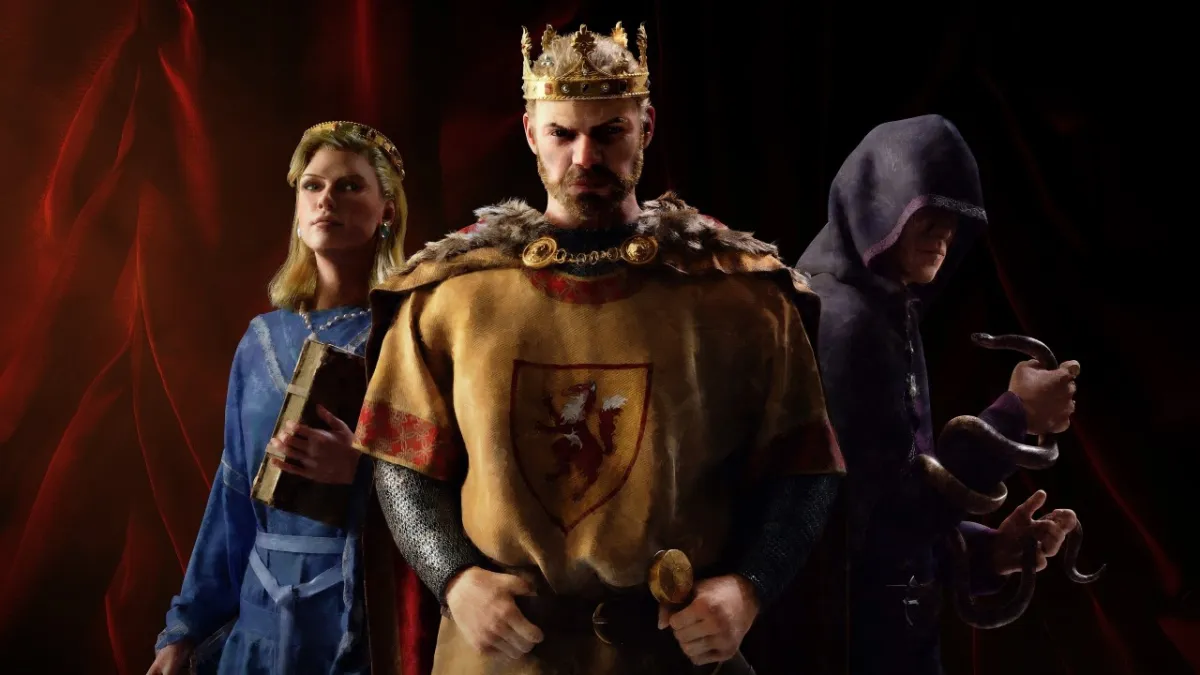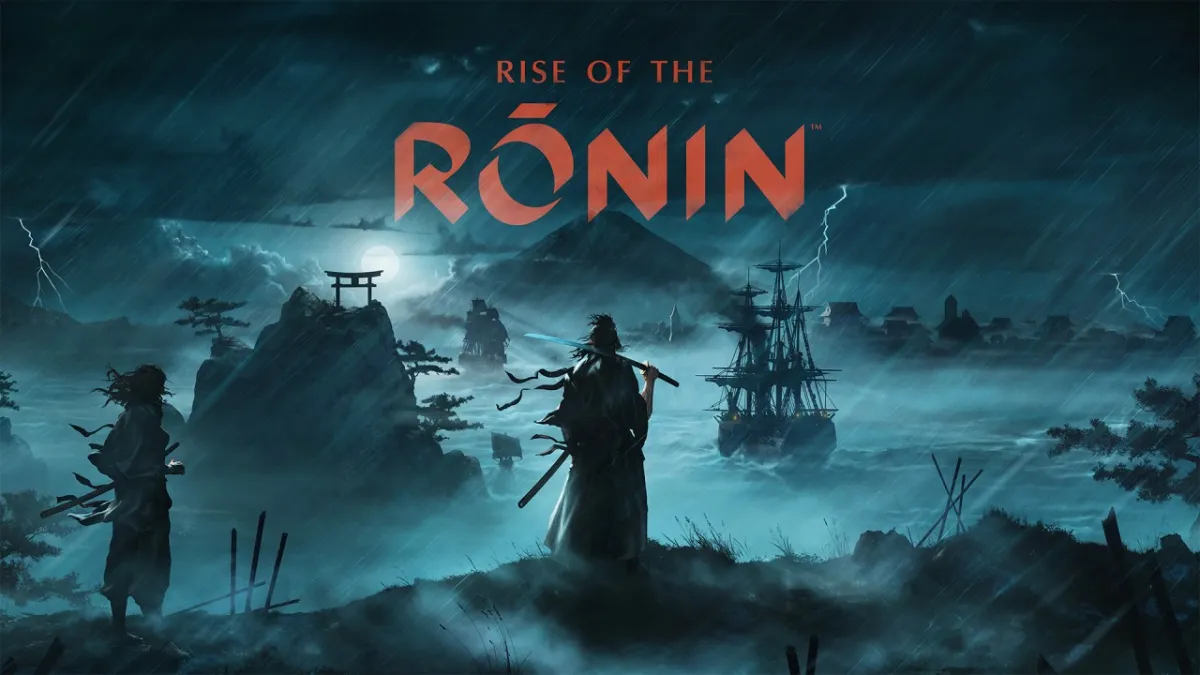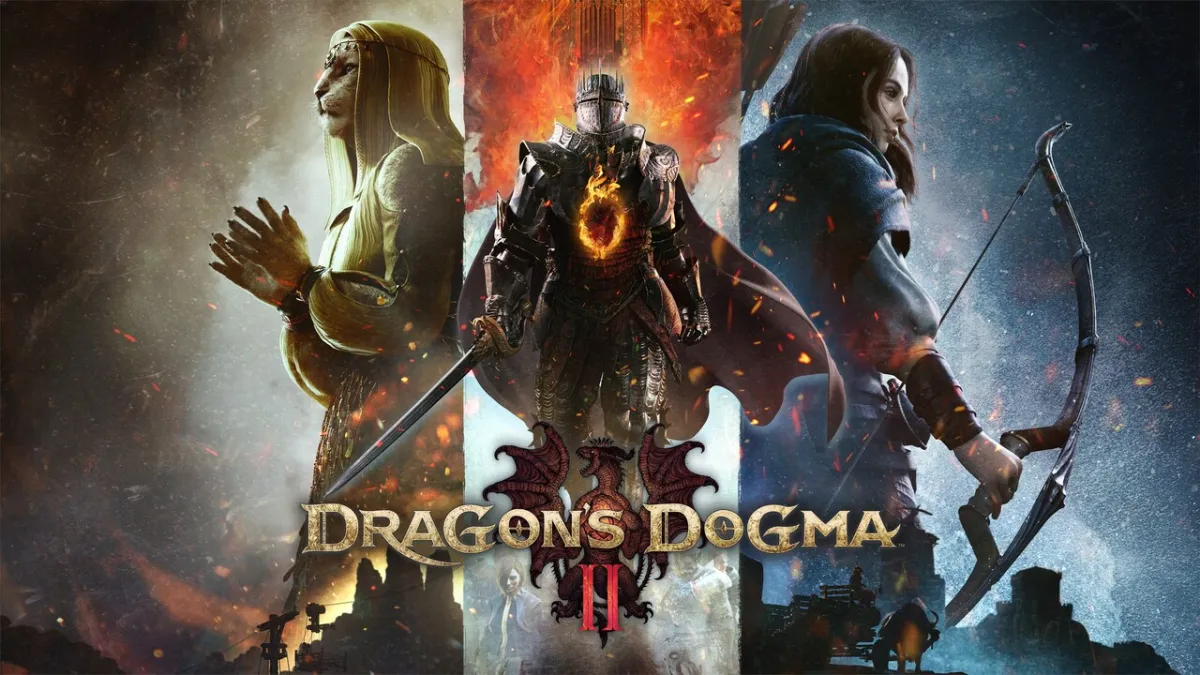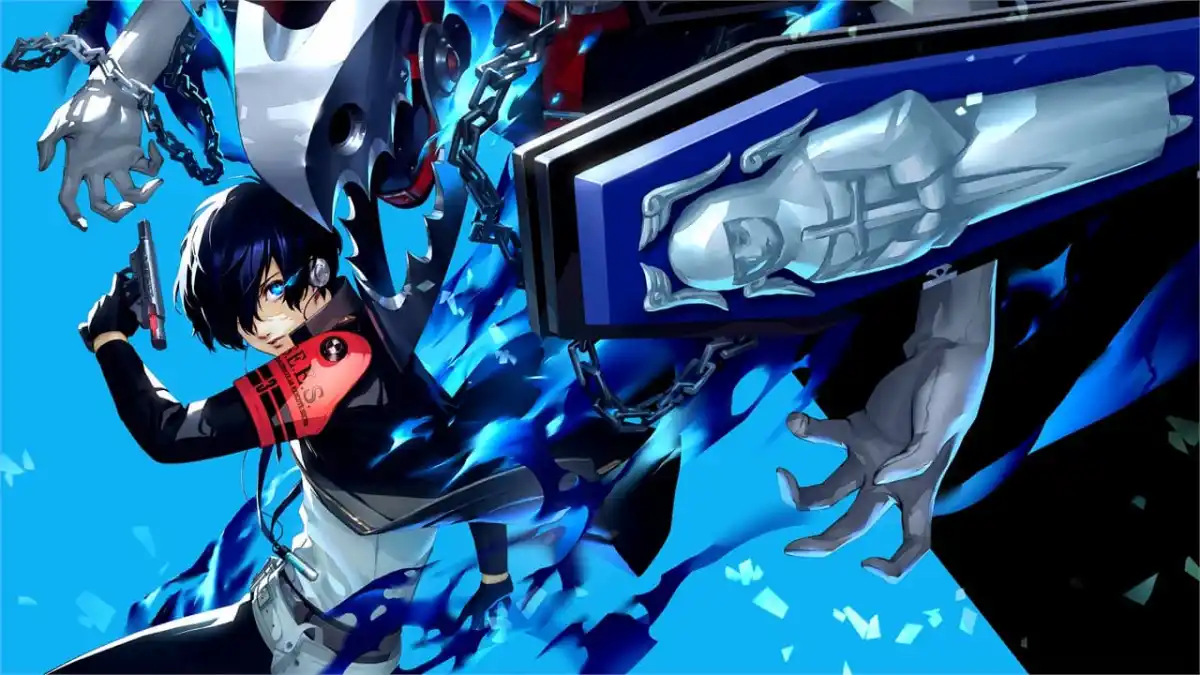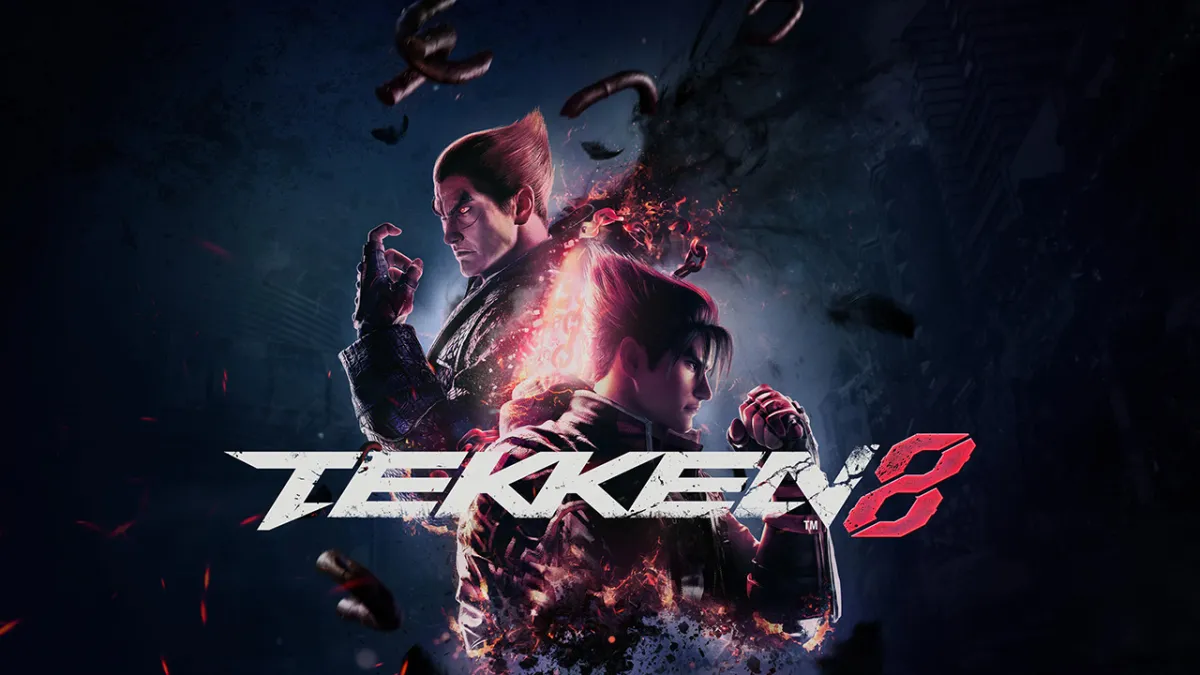Crusader Kings was never a franchise that grabbed my attention: grand strategy games aren’t really my “thing”. I prefer my games to have a story of some sort, and the overwhelming complexity of Paradox’s library was enough for me to bounce off the genre entirely. Then, thanks to its four year celebration sale and associated free weekend, I discovered Stellaris.
Crusader Kings III Video Review
I was smitten from the start. Granted, my first few hours with the game melted my brain into a bubbling mixture of gray matter and confusion, but the emergent storytelling captivated me in a way I hadn’t expected. My first playthrough was a 24+ hour marathon – an endeavour I’d been unable to pull off without serious mental effort in over a decade. Afterwards I had the itch. I wanted to try more of these games, and with Crusader Kings III around the corner I added it to my “games I am most certainly going to play this year” list.
I’d heard about Crusader Kings before from a few of my online gaming communities, so I had a rudimentary understanding of the series’s concepts. Swap the wider galaxy of Stellaris for the Medieval Era of the real world, mix in more robust political mechanics, and add a dash of wholesale baby murder. That, and everyone made sure I knew the games were always under-baked at launch. That was about as far as my knowledge went, but thanks to Stellaris I wasn’t as daunted by the depth of grand strategy games as I was before. Needless to say, when Crusader Kings III came up for review I jumped on the opportunity.
Now that I’ve spent the last week trying to conquer the medieval world I can confidently say this: Crusader Kings III has me hooked. Who would have thought marrying off my relatives for political power, and scheming to murder everyone (and I mean everyone) that stands in my way could be this fantastically fun?
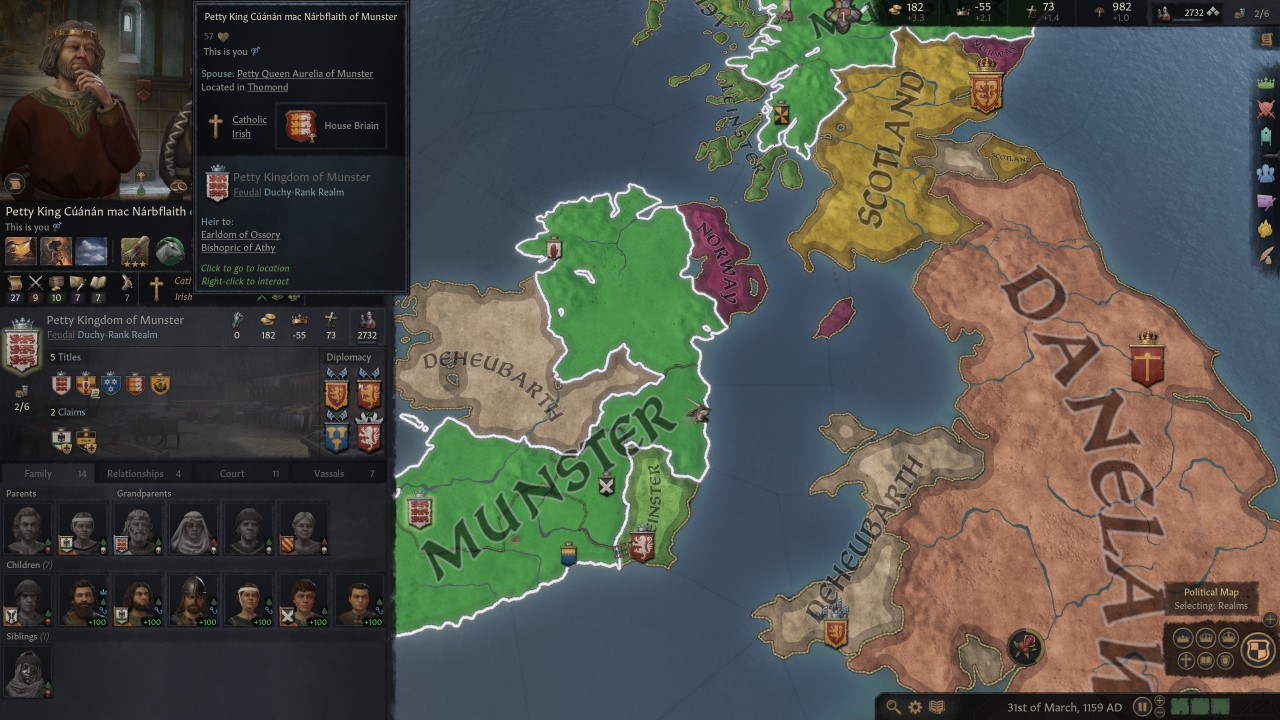
Heir to the throne.
For the uninitiated, Crusader Kings III is a grand strategy game that kicks off in either 867 AD or 1066 AD, depending on what starting nation and ruler you choose to play as. Even without seeing an image it’s not hard to imagine how gobsmackingly large the map is. There are the classic nations, such as William the Conqueror’s early England with crusades aplenty, but you’re also free to play as any other ruler in the world, including early nations from the Middle East, Asia, and Northern/Central-ish Africa.
A nation can be Feudal, Clan, or Tribal and every culture has unique quarks that sell the more “historically” accurate aspects of the game. There are more religions than stars in the sky, and each comes with its own rules and doctrines that shape how a nation under their influence grows. Pair your faith with your actual Culture (which replaces the technology tree from previous games) and you’ll discover an abundance of diverse experiences.
You’re totally free to deviate from reality if you so choose – want to found a new religion that’ll support a matriarchy in an area of the world where that never happened? You absolutely can! What ruler and nation you begin with, and which of the two periods you choose as your jumping off point will determine the challenges you’ll need to overcome if you wish to establish your family’s dynasty as the greatest the world as ever seen, and you can shape your culture and faith as needed to fit your whims (after some good ole’ fashioned grinding, of course).
See, that’s where Crusader Kings stands apart a bit from other grand strategy games. It’s less about taking over every square inch of land and more about cementing a lineage and legacy that’ll stand the test of time. It’s in this regard where Crusader Kings III’s deep roleplaying systems come into the fore. That’s right, Crusader Kings III is as much a roleplaying game as it is a remarkably dense strategy game. Sure, you’ll still have a plethora of numbers and statistics to keep track of, but it’s the roleplaying side of the game that commands the most attention. Crusader Kings III is best played when you’re willing to roll with the punches, and it has perhaps the best emergent storytelling I’ve seen in a game this year.
Look, I get it: if you’re a returning fan everything I just said is nothing new. While neophytes like myself were, and are, ignorant of Crusader Kings’s RPG allure, this facet of the game is arguably what led to its sizable cult following. It’s one thing to take over all of Spain as the nascent Kingdom of Leon with force and military guile alone, yet a whole different affair when your ruler has lost so many of their damned marbles they’ve appointed an imaginary horse as their chancellor. That “horse” may not win me a war, but it highlights how delightful Crusader King III’s pop-up story moments can be.
You can be going about arranging marriages when a screen appears warning you your spymaster discovered a sinister plot to murder your son, and depending on your ruler’s traits and background you will have different ways to respond. These little story moments occur frequently, and weave a rather robust personal tale for each of your rulers. How you react to stress (more on that in a bit), or to someone blackmailing you over your covert witchcraft is all determined by your ruler’s upbringing, specialties, and allegiances. Your typical grand strategy number crunching is conveyed as an array of narrative vignettes that shape the tale of your character, and when you lean into the roleplaying side of Crusader Kings III it plays less like a grand strategy title, and more like the odd bastard child of Sunless Seas and Age of Empires.
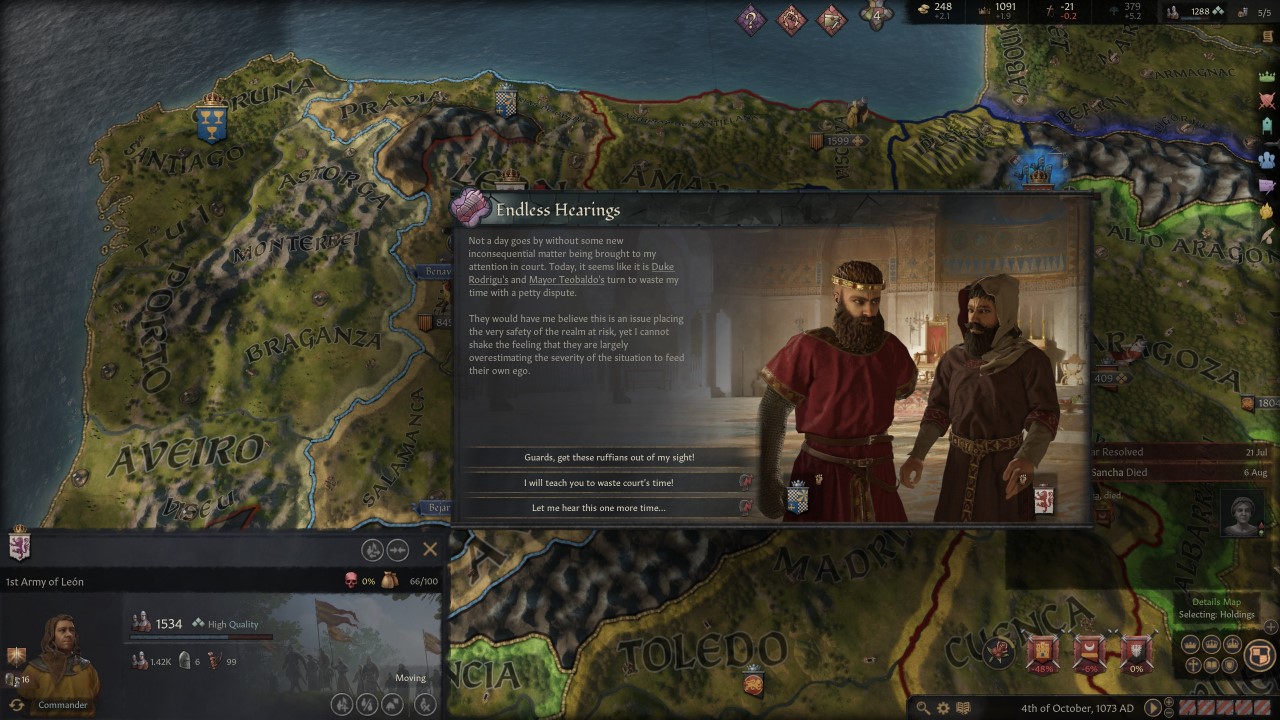
It’s this aspect of Crusader Kings III that makes it so difficult to put down. You don’t simply play as a single ruler, but also as their heir when said ruler passes on. You can easily play a single “campaign” in Crusader Kings III and have controlled well over a dozen or more rulers before the game’s 1453 AD conclusion. In my first playthrough on the “tutorial island” (Ireland, now the de facto starting nation for the tutorial after years of being used as such by the community in Crusader Kings II) I controlled a pious king who never missed a crusade, an intelligent diplomat who used arranged marriages and favorable schemes to keep the kingdom in check, and a tyrant who murdered enough babies that even Satan himself was appalled.
Of course, new players can’t experience the joys of medieval politics if the game throws them directly into the deep end without even a basic pat on the ass. Paradox is well aware of how . . . erm, complicated their games can be, and they went well out of their way to make Crusader Kings III their most accessible title to date. Don’t mistake “accessible” for watered down: Crusader Kings III is still a mind disintegrating affair when approached blind. What separates it from its siblings, like Stellaris, is a healthy mix of streamlining and smart UI design.
For example, your levies (armies) in Crusader Kings II liked to saunter off to whatever rally point you placed on the map from their respective towns, and it was insanely easy for the opposing army to stomp the stranglers into the mud before your warband even formed. Now all your troops appear at the rally point, no matter where it’s at in the world. Nifty! You can set multiple rally points if you do need to split your forces, or want to rapidly deploy to a handful of strategic locations, so the nuance hasn’t been lost. The only sacrifice made was the overwhelming rage you previously felt after watching your war end right as it began.
Crusader Kings III is still a grand strategy game, and that means it has a lot of menus to dig through.
Then there’s the UI: at a glance it’s daunting. There are a lot of menus and submenus to parse; par the course for a Paradox game. What makes it work so well in Crusader Kings III are the hyperlinked key terms that can be hovered over to trigger a descriptive prompt, which itself features a gaggle of hyperlinks for additional key terms. It’s still plenty to take it, but it’s easier than ever to learn Crusader Kings various terms and mechanics. My screen was covered in these nesting doll tooltips for the first few hours I spent with the game, despite the well built tutorial. Obnoxious as that may sound, each tooltip explains its topic quickly and concisely, making it absurdly easy to get smart on whatever the Hell it was I needed to know.
I still had to reference the in-game encyclopedia here and there (and I’m thankful that’s a thing in Crusader Kings III), yet, unlike Stellaris, I didn’t feel the same need to watch YouTube videos just to get started. I mean, I still did (Paradox has an amazing set of basic video tutorials on their channel, all put together by established Paradox content creators), but not because I felt I had to. As I’ve already said, I was new to Crusader Kings, so I wanted to be thorough. What Paradox has baked internally into the game does an excellent job of introducing the fundamentals to newer players, even if some of the minutia remains a bit opaque.
It doesn’t hurt that it’s a relatively slick UI all-around. I do wish I could resize individual windows, rather than settle with the one-size-fits-all scaling option in the settings due to how often they often would block the information I was trying to reference on the world map. That grumble aside, the number of menu icons on the main HUD is actually somewhat minimal, at least when compared to other Paradox titles. The nesting doll-esque tooltips and hyperlinks help cut down the bloat quite a bit, and Paradox made good use of this nesting concept within the larger menus as well. Then again, there were still plenty of times I’d get lost in a sea on dropdown and submenus whilst looking for one particular detail, but as a whole Crusader Kings III has a well constructed UI that assists more than it hinders.
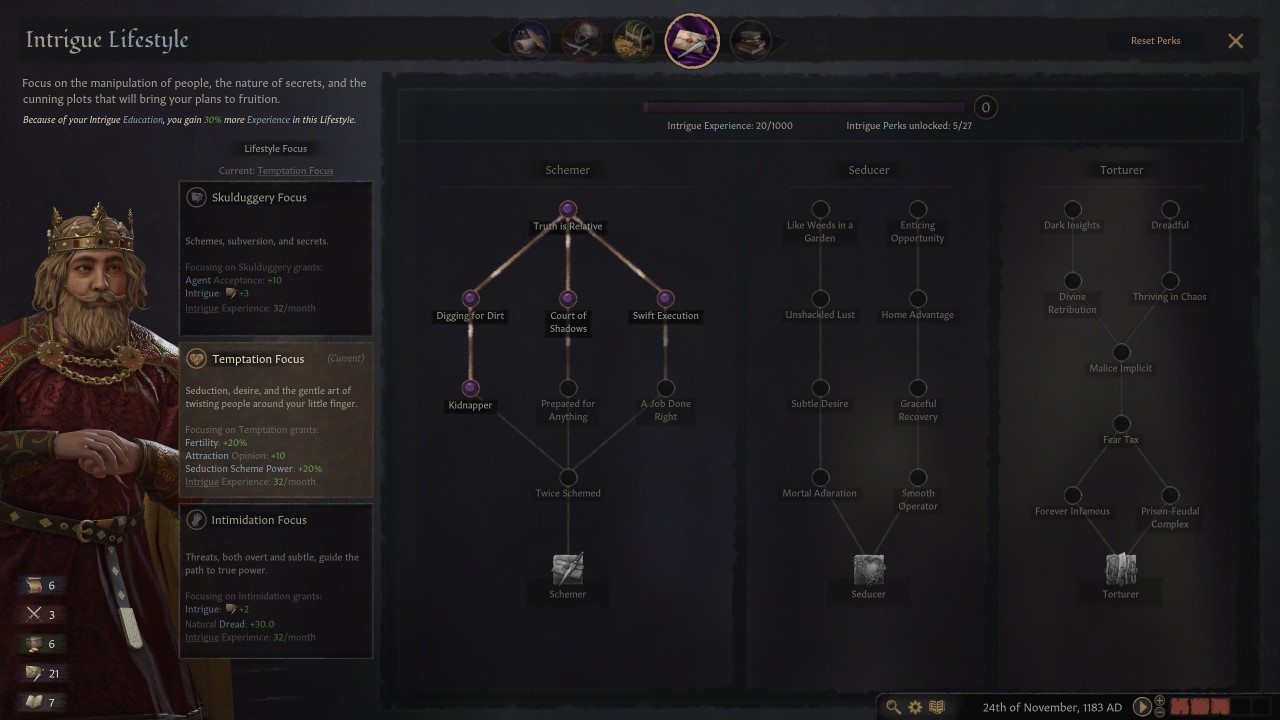
Lifestyles of the Rich and Scheming.
Paradox also added a few systems to Crusader Kings III that are either entirely new, or replace older, more cumbersome mechanics. Your ruler can now suffer from stress, and the more they act out of character (your ruler has traits, because this is still an RPG after all), endure the deaths of loved ones, or deal with adverse events the more stress they’ll accrue. There are three levels of stress, and the more anxious your ruler becomes the more negative the effects. One of my rulers became infertile, while another decided self-flagellation was a great way to relieve themselves (at the the cost of developing the “Wounded” trait, which dramatically reduced their health and life-expectancy). There are an equal amount of ways to reduce stress as to gain it, but they all fit within the emergent nature of Crusader Kings III’s storytelling.
There are also talent trees now, because every good RPG these days needs talent trees. My sarcasm aside, they’re well implemented in Crusader Kings III, and not only confer a variety of bonuses that cater to various playstyles, but help drive home the dynamic roleplaying Crusader Kings III nails so well. They’re called “Lifestyles”, and each aligns with one of your five primary stats. If your ruler has a high Diplomacy stat you’ll likely benefit from choosing the Diplomacy branch, and from there the three focuses and three talent trees within further help you specialize your ruler. In that branch alone you can opt to focus on your family, be a better ruler, or become phenomenal at international relationships: the choice is yours, though you do need to think forward a touch.
You can even educate your children in one of these Lifestyles, unlocking early perks for when you take control.
Each branch has three focuses separate from the three trees that confer passive bonuses that are as specialized as the trees themselves. You can swap focus at any time (even into a different branch if you find yourself needing Martial skills suddenly thanks to aggressive neighbors), but the skill trees themselves require a full reset if you wish to reallocate your skill points. Skill points are earned over time, and the better your base stat for that branch the faster you’ll accumulate them. Once a lifetime a ruler can perform a full reset, but you’ll only refund points in branches you’ve leveled, and you’ll gain 100 stress for the effort. The Lifestyles are flexible at a measured cost.
Then there are the “Schemes” and “Hooks”. These replace the old reputation system, and can be used to manipulate the people around you for both puritan and malign purposes. Personal Schemes are typically benign, and range from simply swaying a bothersome NPC into liking you, to straight-up seducing someone into becoming your lover. Hostile Schemes are, well, hostile actions you can take against another character, such as murdering them before they reach adulthood and inherit a collection of land claims that’ll make your life miserable when they come of age. Secret Schemes are exactly what they sound like: schemes to dig up dirt on other characters that you can either expose to ruin that person’s reputation, or keep as blackmail that’ll provide a potent Hook for later use.
These “Hooks” are how you press other’s into going along with your requests when they otherwise wouldn’t. A Weak Hook can only be used once, and is helpful at forcing smaller requests. A Strong Hook on the other hand doesn’t go away upon use, and can convince even the most stubborn of individuals to bend to your will. You can earn Hooks a variety of ways: from ransoming off prisoners, to turning a blind eye to a courtier insulting one of your vassal’s. They’re peppered throughout the story events, though there are other ways to net valuable Hooks, such as new Scheme options unlocked within the Intrigue skill tree.
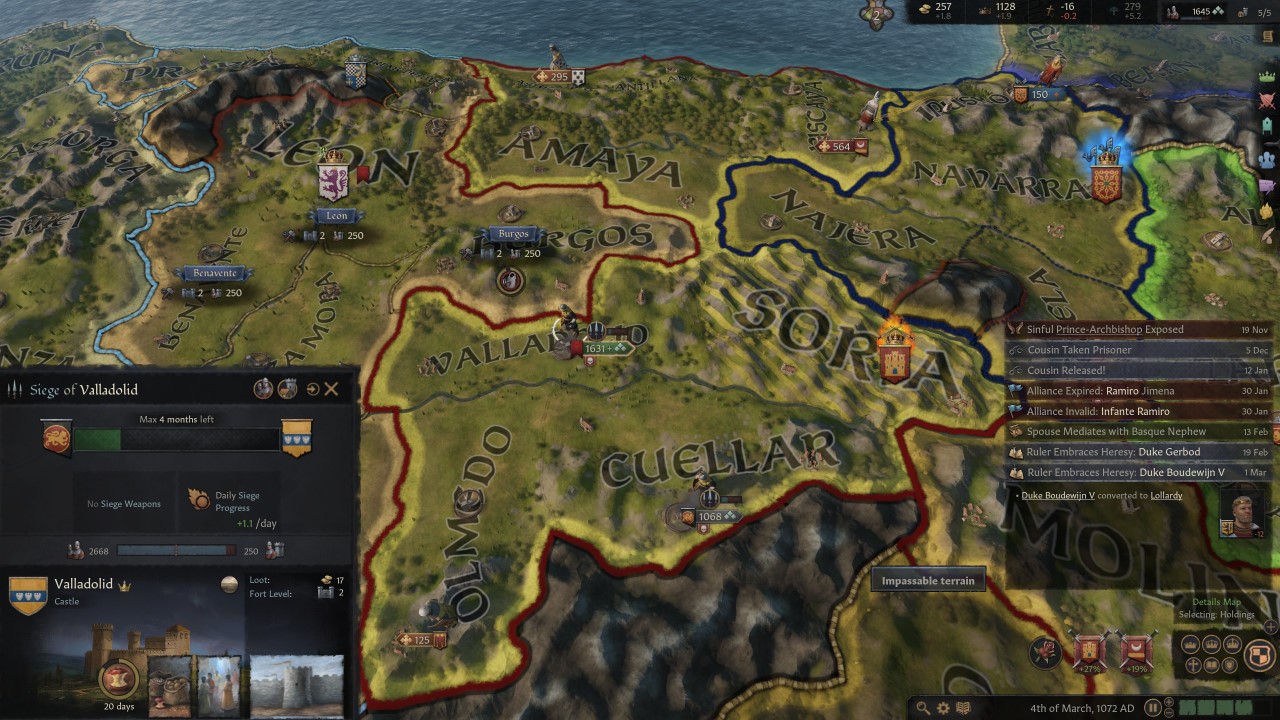
There’s an incentive to collect these Hooks, because they can easily alter problematic vassal contracts, secure important marriages you’d otherwise miss, and more. Schemes and Hooks work in tandem to create a captivating game of skulduggery and manipulation, allowing you to not only convincingly roleplay certain character types, but navigate difficult deals you may not have the money or reputation to pull off otherwise. Though, if you’re struggling with your Schemes and acquiring Hooks you can now swap characters at any time (unless you are playing in the auto-save only Ironman mode). So, if you aren’t up to ruling the Holy Roman Empire anymore because you can’t get anyone to play nice with you, you can easily go to the main menu, select “Change Character,” and find the ruler that fits your fancy (I suggest giving medieval India a spin).
I could write another thousand-plus words on the tweaks and alterations Paradox made, evident even to a novice like myself willing to do some research, but suffice to say every little piece of Crusader Kings III slides smoothly into place to create a captivating and addicting mash of roleplaying goodness and strategy finesse. I’ve pulled more all-nighters playing Crusader Kings III this last week than I have any other game since high school. I know “one more turn” is a Civilization meme, but in some perverse way it kind of applies to Crusader Kings III as well. Substitute “turn” for “year” and you get the same principle: I’d be up all hours of the night trying to unify Ireland, expanding the Duara tribe’s holdings in Africa, or claiming all of Spain under King Alfonso VI.
I’d jump rapidly from checking the stats and traits of my councilors, to story beats such as finding my lost cat Lyle. It sounds like a whiplash on paper, but it’s oh-so-good in execution. If the base experience isn’t working for you there are a choice selection of “Game Options” to tweak, making Crusader Kings III remarkably malleable. I was never bored, because if something wasn’t working for me anymore I’d jump into the settings, flip a few switches, and suddenly I was playing a substantially different scenario. The core loop doesn’t change much, but how you engage with it is entirely up to you.
Crusader Kings III is still a grand strategy game at its core, meaning performance will be a hot topic.
After reviewing the game for a week and testing a variety of scenarios I found the game still murders your CPU when a host of armies are all running amok in a similar area, and the frame-rate plummets further when you up the play speed. These substantial drops were mostly during the crusades, so they weren’t exactly common. Battles with upwards of 15 participates ran somewhat well, at least in context of similar games. When there were 20+ concentrated in a couple of nations my i7-8700K begged for death, but below that? Not too bad. Your framerate will still drop sharply, but it was manageable, and most importantly playable. AI could get wonky at times under load, that’s for sure, but not in any way I felt “broke” the game. Just prepare for your case fans to reach their peak speeds whenever it’s time to take the Holy Land or Genghis Khan comes knocking.
Performance is all the more admirable when you factor in the sharp new 3D portraits for every character that dynamically change due to age, gender, and heritage. The map is more detailed, and battles feature improved animations that don’t look like two dudes swinging savagely into the empty air. Despite the new bells and whistles, Crusader Kings III isn’t a graphical powerhouse by any means. Genuinely ancient GPUs can and will run the game just fine. Hell, even older CPUs, despite what I wrote above, won’t struggle too much outside massive, concentrated wars. The recommended system requirements for Crusader Kings III are pretty modest, so unless your rig is an absolute dinosaur you should be fine. In short: Game Pass subscribers can safely try this out without stressing over their PC (which, if you didn’t know Crusader Kings III is on the Xbox Game Pass for PC, you do now).
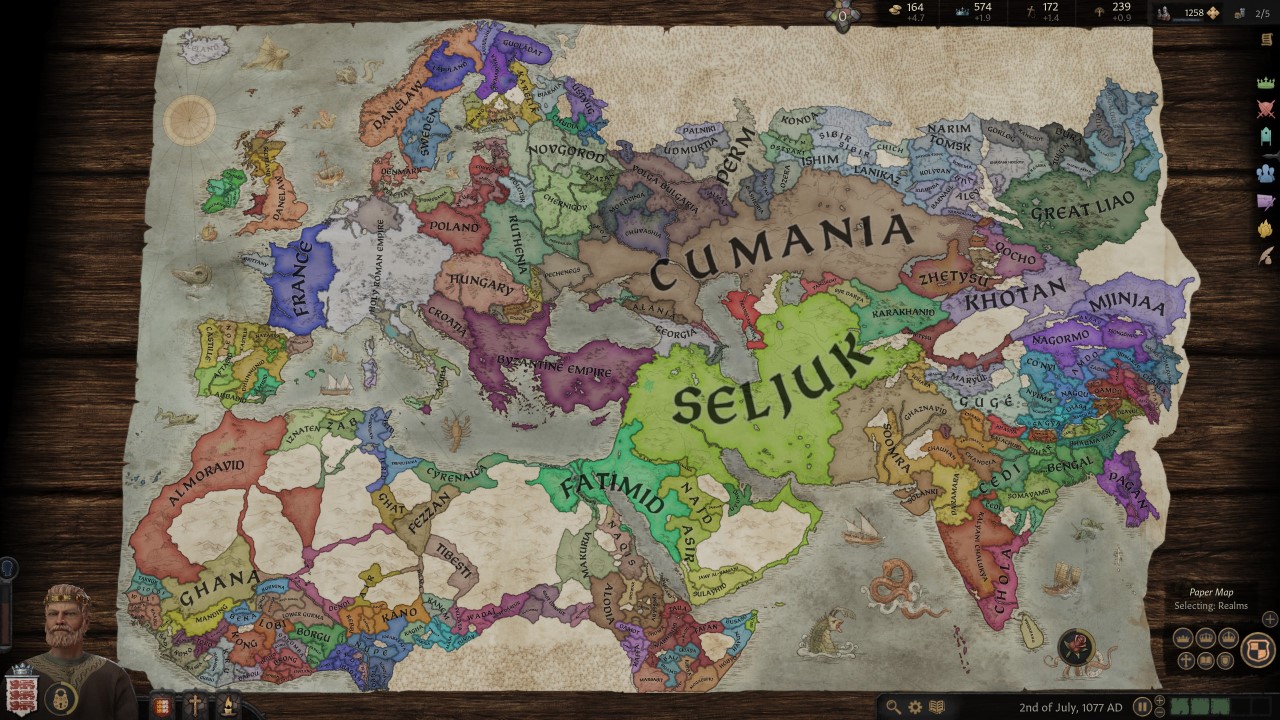
The Verdict.
There’s a running joke I’ve learned about Paradox grand strategy games: they’re not actually finished until a year or so after launch. I saw it with Stellaris and its bevy of adjustments and DLC packs. I’ve heard this same statement in every gaming group and forum I’ve visited that’s discussed Paradox’s library. When I first expressed interest in Crusader Kings III, well before I was tasked with reviewing it, I was even warned to go in with low expectations; that’d it’d be fun, but there’d be more half-baked systems than I could swing a sword at.
Crusader Kings III is a complete, well-rounded game. Maybe I’m just too new to the franchise to know better, but at no point during my time with the game did I feel like any individual portion of the game was under cooked, or needed another year’s worth of work. It doesn’t have everything that’s been added to Crusader Kings II over the years, yet in many ways it feels like Paradox took the best bits out of that previous game and wove them together into their most comprehensive launch yet. There are features not included on day one that will end up in one of the twenty-thousand DLC packs Paradox will inevitably create for the game (such as Merchant Republics), yet what’s here now is more than enough to fuel hundreds, if not thousands, of hours of backstabbing, dynasty building enjoyment.
Crusader Kings III is perhaps Paradox’s most accessible game to date. It’s not any less complicated than previous entries, but it does a fantastic job explaining itself to new players, making it the best jumping on point for those who’ve always been interested in grand strategy games, but were turned off by their complexity and overwhelming depth. I’ve never been the biggest fan of grand strategy games, yet I can’t put it down. Crusader Kings III’s near perfect marriage of robust grand strategy with compelling roleplaying means both fans of wargames and storytelling aficionados will find something to love in its medieval world of politics and intrigue, whether that’s crunching numbers to efficiently conquer the known world, or rolling with the punches as they scheme their way into the annals of history.


